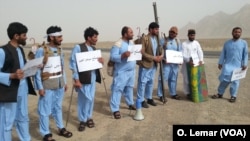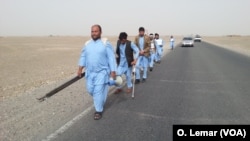At the beginning of the holy month of Ramadan, a group of eight young men set off in Helmand province for a 600-kilometer march to the capital, Kabul, to press for peace. Like other Muslims observing Ramadan around the world, the men abstained from food and drink from dawn to dusk, which made their walk more grueling.
About 400 kilometers into the march, the group grew from eight to 59 men trekking through villages calling for a cease-fire in the long-running war against Taliban insurgents. By this week the march had grown to about 200 activists chanting in Pashto: "Zhwand che mo badrang day, jang dai jang dai" — "That our lives are ugly is because of the war."
War-weary Afghanistan
The scene has become a common sight in Afghanistan, as a war-weary public increasingly becomes more vocal in its disapproval of the war, often turning to social media, including Facebook and YouTube, to plead for peace.
"While it has been more than 40 years of war, the differences between each phase of the war, with the changing nature of foreign patrons and Afghan forces, has made it more complicated for Afghans across different geographic, ethnic and political divides to see a common bond, a shared recognition that all sides have suffered and need to find better way forward," said Patricia Gossman, Afghanistan senior researcher at Human Rights Watch (HRW).
"I think that may be happening now," she told VOA.
Lukewarm response
The peace activists initially appeared to target the Taliban, who have been fighting the United States and Afghan government forces for nearly 17 years. But marchers have also included a highly sensitive item on their list of demands — a timetable for the withdrawal of foreign military forces, based on an agreement between warring parties.
So far, the sporadic and rudderless activism has not received a serious response from any of the warring parties, as each blames the other for the continuous war.
Taliban spokesman Qari Qusuf Ahmadi said the activists should direct their demands toward U.S. forces. Washington insists that the door is open for the insurgents to engage in peace talks with the Afghan government. The Afghan government has offered unconditional peace talks to the Taliban, but the group has turned down the offer.
"The marchers from Helmand seem to represent a genuine, local grassroots activism," Gossman said. "Different people may try to co-opt it, or try to misrepresent it as taking one side or the other, but it seems to me that these are people who have lost a lot to this war — to suicide bombings and airstrikes both — and are tired of losing their children to war," she said.
A spokesman for Afghan President Ashraf Ghani said there are no plans to officially welcome the peace marchers when they arrive in Kabul later this month.
Sayed Ihsan Tahiry, a spokesman for the country’s High Peace Council, said council officials will "be available to meet them, if they want."
Marchers' demands
Among their demands, the peace marchers have listed meetings with civil rights activists, politicians, government officials and foreign diplomats. They will not meet with Taliban or Islamic State officials.





